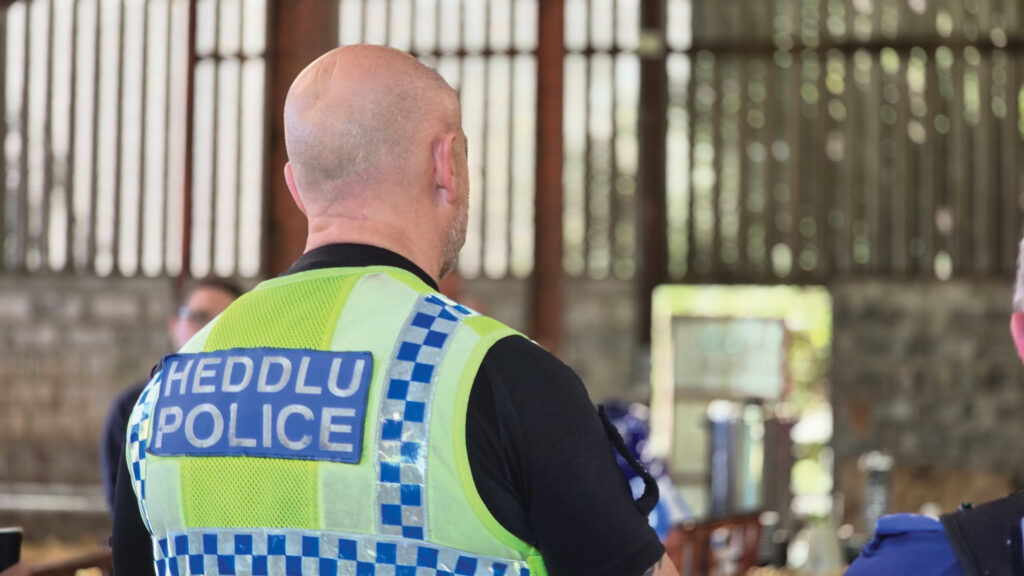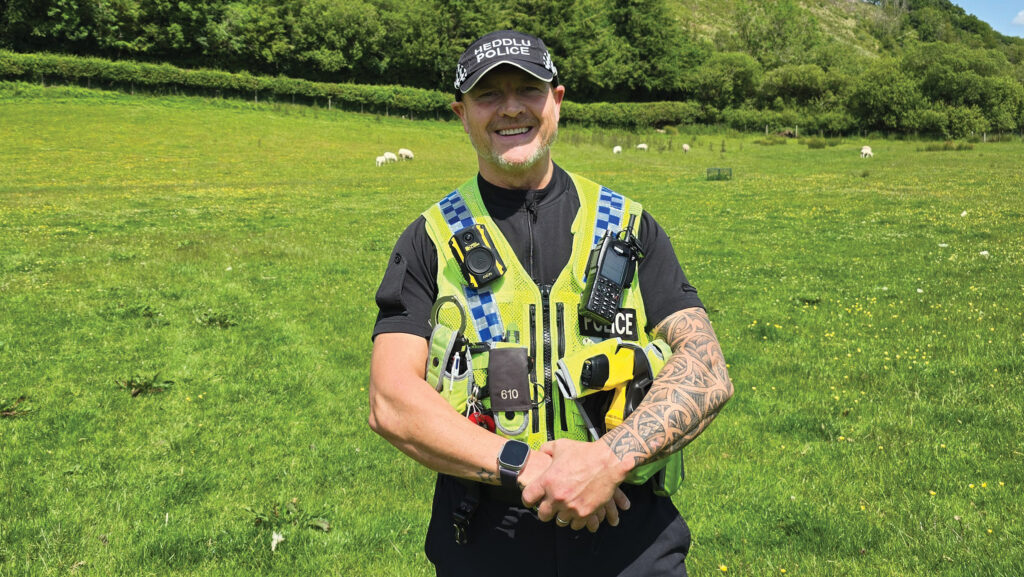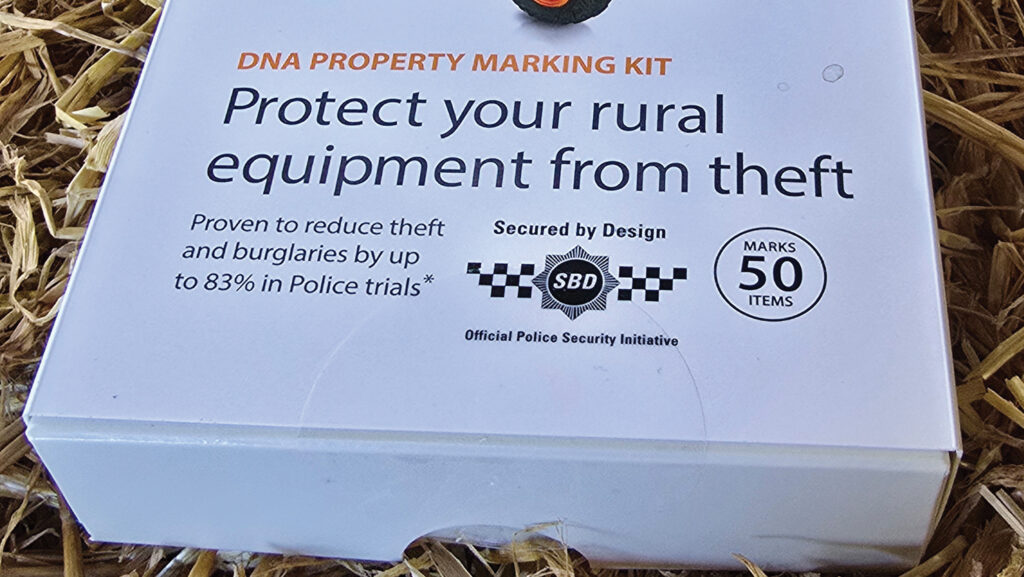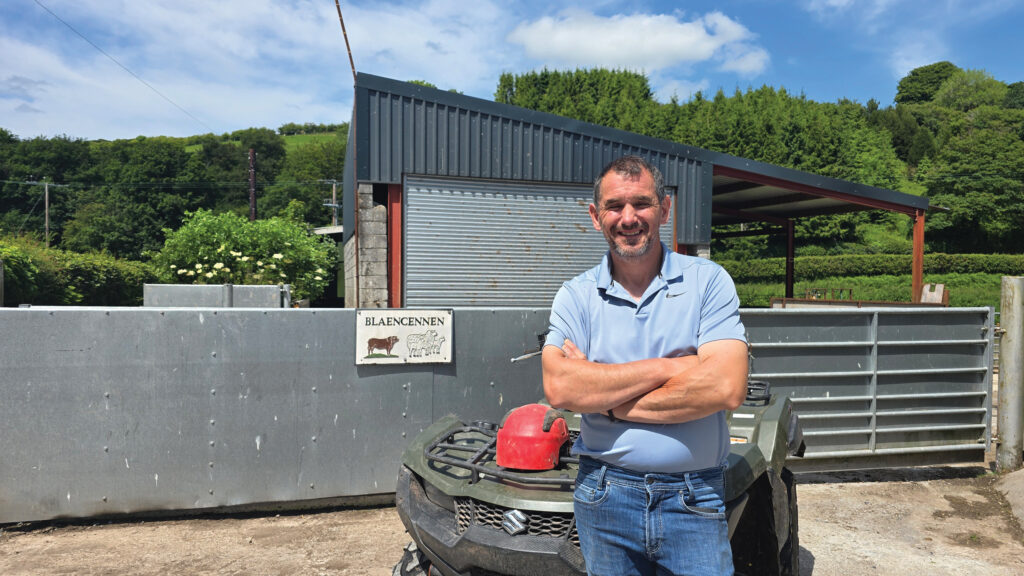Co-ordinated action sees drop in rural crime cost
 © MAG/Anne Dunn
© MAG/Anne Dunn While the scourge of rural crime still cost the industry an estimated £44.1m in 2024, across the UK that still represents a welcome fall of 17% from the previous year’s bill, according to the latest rural crime report from NFU Mutual.
And the positive result, says the rural insurer, has its roots in co-ordinated action and collaboration.
See also: NFU demands action on rising rural crime rates
Hannah Binns, rural affairs specialist at NFU Mutual, says that, while the drop is encouraging, the industry must stay alert and continue to collaborate.
“Co-ordinated efforts from insurers, farmers, manufacturers, police, industry and lawmakers are crucial in delivering a unified response to the rural crime challenge posed by organised criminals and opportunistic thieves,” she said.
Rural crime by region
In England, the Midlands scored the highest in total cost of rural crime per region with £8.1m, but it also saw the greatest fall, dropping by 31% from £11.7m in 2023.
Northern Ireland and Scotland also saw decreases, down 9% and 33% to £1.8m and £1.2m, respectively.
Wales was the only area to see a cost increase, up 18% to £2.8m.
Despite this increase, Rob Taylor, Wales rural and wildlife crime co-ordinator, insists his force remains committed to tackling rural crime.
“A key part of our co-ordinated approach is the new revised Wales Wildlife & Rural Crime Strategy, which will be launching in July,” he explained.
This aims to further enhance collaboration between the police, partner agencies, and farmers to reduce rural crime.
Types of rural crime
In terms of what the criminals were after, quad bikes and all-terrain vehicles (ATVs) remained the top target, with thefts amounting to an estimated £2.7m, albeit that this figure was 16% lower than in 2023.
Overall, agricultural vehicle thefts fell 35% to an estimated £7m last year, while GPS units experienced an even greater fall – down 71% to £1.2m, following a spike in 2023.
Livestock theft remained high in 2024 at an estimated cost of £3.4m across the UK.
UK farm animals worth an estimated £1.8m were severely injured or killed in dog attacks in 2024, but that too was down by more than a quarter compared to the previous year.
In Wales, Dafydd Llywelyn, police and crime commissioner for the Dyfed-Powys area, says his main message to farmers is to recognise the importance of reporting suspicious activity and all incidents to the police.
“The police can only deal with what they know, and sometimes what might seem like a small piece of information – for example, details of a suspicious vehicle or individuals acting suspiciously – can be the missing piece of a jigsaw,” he said.
Countering crime
Working together, the National Rural Crime Unit and NFU Mutual operate a dedicated team that shares data to identify risk areas and theft patterns, leading to increased recoveries.
This kind of collaboration saw the National Construction and Agri Theft Team seize £4.4m worth of stolen agricultural vehicles and machinery in 2024.
“International recoveries also increased to £1.15m due to our information sharing agreement with Interpol,” says the team’s supervisor, DS Christopher Piggott.
Last year, NFU Mutual also committed funding for a three-to-four-year term for the UK’s first livestock theft officer, and provided more than £400,000 for other rural crime fighting initiatives.
“We’ve seen real progress, including the passing of the Equipment Theft (Prevention) Act, hare coursing amendments in the Police, Crime, Sentencing and Courts Bill, and the Dogs (Protection of Livestock) Amendments Bill now moving through Parliament,” adds NFU vice-president Rachel Hallos.
“But we still need to see swift implementation and enforcement to make a real difference on the ground.”
Crime prevention tips
Addressing crime requires a collaborative approach, but rural groups say there are steps the rural community can take, alongside new legislation and police efforts, to strengthen their homes and businesses.
“We advise members to take key preventative actions such as regularly checking locks, installing CCTV and alarm systems, and using tracking devices on machinery and equipment,” says Rhianna Montgomery, NFU Scotland policy manager.
Dyfed-Powys PC Ashley Jones, who is part of the rural crime team in Carmarthenshire, says farmers and rural residents need to get more savvy.

Dyfed-Powys PC Ashley Jones © MAG/Anne Dunn
“When I go out to farms for crime prevention surveys, often the first thing we come across is expensive agricultural equipment, quad bikes, Kubota trucks, tractors, with the keys still in the ignition. You’ve got to try and think like a criminal,” he says.

Selecta DNA forensic marking kits © MAG/Anne Dunn
Investing in a portable locking system for quadbikes, as well as making sure vehicles and equipment have been marked with UV pens or Selecta DNA forensic markers, are other tools available to farmers.
To stay secure, farm businesses should also:
Physical
- Close and lock all gates and consider entry and exit points
- Remove keys from vehicles and store them in a safe, secure place
- Park farm machinery and vehicles out of sight, preferably in a lockable building
- Lock away high-value items such as GPS units
- Mark livestock and property
- Note serial and chassis numbers of items you own
- Use animals (such as a dog) to scare criminals off
Technical
- Install CCTV, security lighting and alarms
- Cesar mark, etch or mark farm name and postcode onto kit
- Add tracking devices and immobilisers onto vehicles
- PIN protect GPS units and apply manufacturer stickers
- Use mechanical immobilisers such as steering wheel or pedal locks on vehicles
Social
- Report all crimes and suspicious activity to the police
- Join and participate in rural watch groups such as the Farm Watch scheme
- Use local WhatsApp groups for immediate updates on suspicious sightings
- Use the Crimestoppers number, 0800 555 111, to report rural crime anonymously
Case study: ‘Stealing to order’
An arable and beef farmer from Hertfordshire had to lodge an insurance claim of £18,000 when he discovered that criminals had ripped out the electronic control system from a brand-new combine harvester, and stolen the GPS receiver and control screen from a Househam self-propelled sprayer.

Gary Williams © MAG/Anne Dunn
The 809ha farm near St Albans, which has been farmed by the Hudgell family for three generations, was struck by the thieves at night.
A neighbouring farm was raided exactly the same way 30mins later.
Despite clear CCTV footage, police were unable to track down the thieves as they were wearing balaclavas and gloves, leaving no fingerprints.
“It was obvious the thieves were stealing to order,” says Roger Hudgell.
“Let’s just say I was extremely annoyed – especially as we have invested a lot of money on security measures including CCTV, alarms and locks on all the gates,” he says.
The farm has been targeted previously by organised criminals and, in one raid, thieves broke into its chemical store and took 900 litres of high-cost products, to the value of £27,000.
‘The power of community’
The power of the community working with their local rural crime team has recently seen the conviction of Carmarthenshire sheep rustler Hywel Williams, 40, from Llanddeusant.
Mr Williams was found guilty of the theft of 73 ewes and was ordered to pay £5,600 in compensation to owner Rhodri Llyr Evans.
He was also sentenced to a 12-month prison term, suspended for 24 months, and ordered to undertake 250 hours of community service by Aberystwyth Magistrates Court.
Inspector Matthew Howells, tactical lead for the Dyfed-Powys Police Force rural crime team, says the farming community was instrumental in solving the case.
“It shows the strength of unity in the community and the industry, and I would urge anyone who has concerns about rural crime to report any issues they have to the police – working together we will bring criminals to justice.”
Major concern
Gary Williams, who farms 121ha at Blaencennen, Gwynfe, Llangadog in the Black Mountain area, says livestock rustling has been a major concern for a while.
He has farmed in the area all his life and keeps 700 breeding ewes plus 180 ewe lamb hog followers.
The family also contract rears 60 dairy heifers over the winter period.
Mr Williams says he is grateful to the rural police force for bringing Hywel Williams to justice.
“This individual had built himself a reputation in the community and the only way for us to deal with that was working together.
“There’s nothing worse within the farming community than if a farmer steals from another farmer. It’s about as bad as it gets.”
He adds that he hopes this will serve as a warning to others “that this won’t be accepted by the farming community”.
Over the years, Mr Williams says he has suffered from theft, including gates, chainsaws and other opportunistic crimes.
“We’ve also had numerous quad bikes stolen in the area. It’s an on-going problem.
“That’s why we’re trying to work closer with the police and are building relationships.
“The danger now is that these people are becoming more violent and dangerous,” he says.
